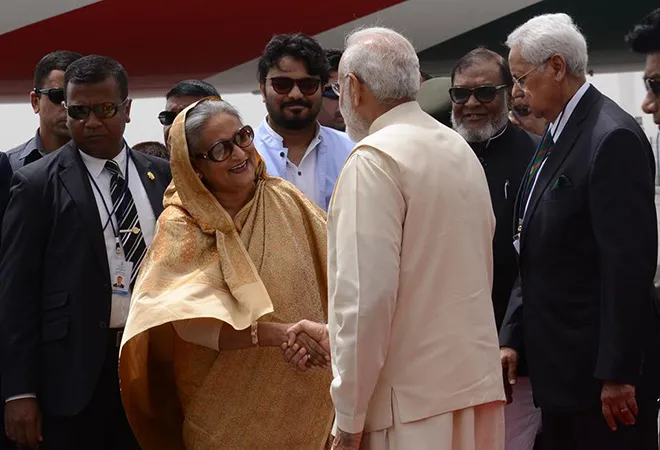The four-day state visit of Bangladesh Prime Minister Sheikh Hasina has set a new benchmark and is a reassurance of the friendship between India and Bangladesh. Hasina was in India from April 7 to April 10 following an invitation by Prime Minister Narendra Modi. She was given a warm welcome, and in a rare gesture, which also suggests the importance of Bangladesh to India, Modi received her at the airport.
It was her first bilateral visit in seven years and the last one before Bangladesh goes to parliamentary polls in 2018. The visit gained publicity because of the Teesta agreement. A water-sharing agreement on Teesta is pending since 2011 due to the objection by the West Bengal government. This has been a major point of contention between the two countries. The Opposition in Bangladesh was critical of the visit because Hasina has not been able to strike a deal on Teesta with India. However, leaders from both countries, especially Hasina, are worthy of appreciation for showing pragmatism and not letting the relationship to be held hostage because of this.
The non-signing of a Teesta accord is a disappointment. There is recognition in India about the sensitivities attached to Teesta in Bangladesh and Modi has mentioned to resolve it. To continue with the spirit of neighbourly relationship, resolution of the Teesta agreement will be desired.
But should Teesta be the only parameter for judging the visit? Besides, meeting Modi, she also met top leaders, including President Pranab Mukherjee, vice president Hamid Ansari and external affairs minister Sushma Swaraj. These meetings showcased the warmth between the two countries, and the desire to widen the horizon of cooperation. The joint statement issued during the visit gave account of the issues discussed and stressed on the values that would lead the future cooperation which could well be analysed from the headlines that divided the various sections. For example — working together to create a secure environment, building bridges to optimise people to people contact, trade and investment promotion for shared prosperity, friends at home — partners in the region and the world. Indicating India’s overall goal of creating a prosperous neighbourhood where Bangladesh as a key partner.
The immediate outcome of the visit was the 22 agreements in various areas, including defence cooperation, civil nuclear cooperation, cyber security, power cooperation, skill development, developmental cooperation, etc. These agreements signify a keen desire to learn and share experiences and expertise. Many of these agreements will not only help in securing the region but also will improve trade and connectivity, and, in the long run, promote economic well-being for all. India offering to construct 35 community clinics in Bangladesh speaks of the ideal of shared growth and well-being of the region.
Most significant is India offering a $4.5 billion line of credit, additional to $2 billion, to Bangladesh for various development projects. This line of credit will be beneficial both for India and Bangladesh as it will help to improve connectivity in the Northeast.
Again, the visit shed the scepticism in the bilateral ties especially after Bangladesh bought two submarines from China — many had expressed reservation about it.
India also did not raise issues that might have disrupted the bonhomie. Some expressed displeasure over New Delhi not raising issues like illegal migration or atrocities on minorities in the Bangladesh.
India-Bangladesh ties are on a new trajectory. To continue this momentum the two have to address each other’s concern and deliver the promises made.
This commentary originally appeared in Hindustan Times.
The views expressed above belong to the author(s). ORF research and analyses now available on Telegram! Click here to access our curated content — blogs, longforms and interviews.




 PREV
PREV


